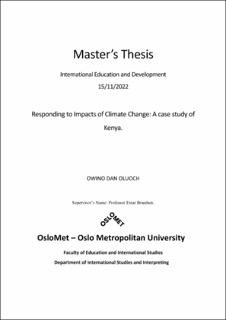| dc.description.abstract | Climate change is a global emergency and a pressing issue globally and therefore need for effective response. This paper aims to understand the response strategies to climate change. I use Kenya as a case study to answer the questions: How has the Kenyan government responded to impacts of climate change? Where is the priority given between adaptation and mitigation; and what are the capacity concerns in coping with climate change? I apply the theoretical perspectives of climate change mitigation options, adaptation strategies and institutional capacity approach as a guide. The research questions are investigated through interviews and document analysis. The interview forms part of the primary information while document analysis is considered secondary information. Together I did five interviews where various representatives from different public agencies were interviewed on response strategies to climate change in Kenya. The first main finding of the thesis is that mitigation options such as forest conservation and afforestation, and different types of renewable energy sources and different adaptation strategies are practiced in Kenya as a response strategy to climate change. However, Carbon Capture and Storage as a mitigation option is not being practiced in Kenya because of lack of technology involved. Another main finding is that adaptation is given more priority than mitigation by the Kenyan government because of the vulnerability of different pastoralist communities living in arid and semi-arid areas. The last finding of the thesis is that despite Kenya having limited institutional capacity on climate related actions, it has responded well to climate change through mitigation and adaptation. Although there is support from the international community as per the Paris agreement, what is provided is not enough to mitigate the effects of climate change and help communities adapt to a changing environment. Given the emphasis is put more on adaptation than mitigation, there is an urgent need to increase allocation for adaptation in Kenya especially on water sector and disaster risk management. | en_US |
